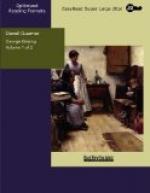“Don’t be such a simpleton, Annie! If only you knew anything of life, you would be glad of what has happened. You are free again, and freedom is the one thing in the world worth having. To sit and cry because—I’m ashamed of you!”
Surprise and misery caused the tears to break forth again.
“Go to bed, and go to sleep!” said the mistress, harshly. “If ever you are married, you’ll remember what I said, and look back to the time when you knew nothing worse than silly girlish troubles. Have you no pride? It’s girls like you that make men think so lightly of all women—despise us—say we are unfit for anything but cooking and cradle-rocking! If you go on in this way you must leave me; I won’t have a silly, moping creature before my eyes, to make me lose all patience!”
The girl took up the tray and hurried off. Her mistress sat till late in. the night, now reading a page of the proofs, now brooding with dark countenance.
CHAPTER XIX
The polling would take place on the last day of March. On the day previous to that of nomination Glazzard and Serena Mumbray were to be married. Naturally, not at Mr. Vialls’ church; they made choice of St. Luke’s, which was blessed with a mild, intellectual incumbent. Mrs. Mumbray, consistently obstinate on this one point, refused to be present at the ceremony.
“There will be no need of me,” she said to Serena. “Since you choose to be married as if you were ashamed of it, your father’s presence will be quite enough. I have always looked forward to very different things; but when were my wishes and hopes consulted? I am not angry with you; we shall part on perfectly good terms, and I shall wish you every happiness. I hope to hear from you occasionally. But I cannot be a witness of what I so strongly disapprove.”
William Glazzard—who saw nothing amiss in his brother’s choice of a wife, and was greatly relieved by the thought of Serena’s property —would readily have gone to the church, but it was decided, in deference to the bride’s wish, that Ivy should come in his stead.
Ivy had felt herself neglected lately. Since the announcement that her uncle Eustace was to marry Serena, she had seen very little of the friend with whom alone she could enjoy intimate converse. But on the eve of the wedding-day they spent an hour or two together in Serena’s room. Both were in a quiet mood, thoughtful rather than talkative.
“This day week,” said Serena, breaking a long silence, “I shall be somewhere in Sicily—perhaps looking at Mount Etna. The change comes none to soon. I was getting into a thoroughly bad state of mind. Before long you would have refused to associate with me.”
“I think not, dear.”
“If not, then I should have done you harm—and that would be a burden on my conscience. I had begun to feel a pleasure in saying and doing things that I believed to be wrong. You never had that feeling?”




